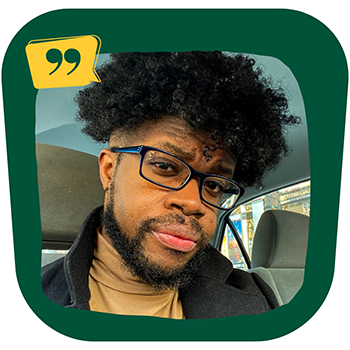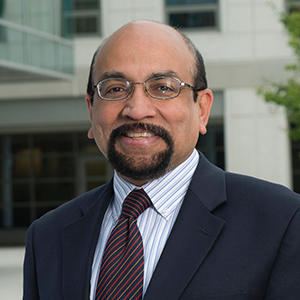Are you a busy professional seeking to elevate your career? Our part-time, hybrid Master of Organization Development and Knowledge Management empowers you to build advanced coaching expertise, lead human resources initiatives, and drive meaningful organizational change, without pausing your professional momentum.
In just 20 months, you will gain practical, coach-based tools and flexible scheduling (Friday evenings and alternating Saturdays), and graduate ready for roles such as HR change manager, organizational coach, learning and development leader, and more.
Key Program Features:
- No GRE or GMAT required to apply
- In-state tuition for Virginia residents; equivalent rate for D.C. and Maryland residents
- Cohort program
- Executive schedule (classes on Friday evenings and Saturdays)
- 33 credit hours over five semesters, usually completed in 20 months
- Live hybrid format (all class materials are presented live and synchronously with no recorded classes; some classes are virtual, some classes are in person)
- Experientially based curriculum (i.e., learning by doing)
Why This Degree Matters to You
- Develop high-impact coaching skills: Complete two required coaching courses that count toward ICF/EMCC coach education hours and learn to facilitate powerful change conversations.
- Study on your schedule: Weekend-based hybrid learning—live sessions on Fridays and Saturdays—keeps your current career on track.
- Flexible part-time format: Start when you're ready, spread over five semesters to enter leadership roles without interrupting your job.
- HR and organizational development focus: Equip yourself to lead HR teams, drive culture change, and strengthen talent management.
- Multiple career pathways: Open doors to roles like talent development manager, OD consultant, knowledge manager, HR business partner, and executive coach.
Upcoming Virtual Information Sessions
ODKM Information Session, Tuesday, July 22, noon to 1 p.m. ET (Virtual)
Email us: schar@gmu.edu
Call: 703-993-8099
What Sets Us Apart
- Coaching-centered approach
Two embedded coaching courses amplify your influence as a leader—gain credentials and techniques to support individual and team development. - Career-balanced flexibility
A cohort-based, part-time format with weekend scheduling ensures you continue working while earning your degree. - Real-world HR alignment
Coursework integrates HR systems, organizational behavior, change management, and strategic culture initiatives—preparing you for hands-on HR roles. - Diverse career outcomes
You will graduate ready to enter a spectrum of HR-related and consulting fields from change management to executive coaching, knowledge systems, and organizational strategy.
VIDEO: What is Organization Development?
ODKM program director and professor Tojo Thatchenkery explains what organization development is.
VIDEO: The 3 Ds of Organization Development
ODKM faculty member John Hovell breaks organization development into three different types of OD, the 3 Ds, which he names as diagnostic, dialogic, and dynamic.
VIDEO: OD’s Relevance in Today’s World
ODKM program director and professor Tojo Thatchenkery explains how organization development remains more relevant, if not more so, in today’s working environments.
Equipping Graduates to Navigate Today’s Working World
Graduates will leave the program with the ability to positively contribute to improving organizational culture, climate, and team environments, ultimately supporting organizations in moving toward more connected, humane, and transformative social enterprises. Skills you will gain include:
- Organizational and Societal: systems thinking, knowledge management processes, organizational analysis and diagnostic tools, appreciative inquiry, action research, facilitation, design thinking, dialogical organization development, and organizational transformation
- Group: coaching skills, dialogue, change conversations, and process work
- Individual: analytical skills, emotional intelligence, mindfulness, appreciative intelligence, and reflection
A Path to Becoming a Coach
As part of the program, students enroll in two required courses focused on coaching. The classroom hours can be used in partial fulfillment of the coach education hours required for certification by credentialing bodies such as the International Coach Federation and the European Mentoring and Coaching Council. Learn more about coaching in ODKM here.
Curriculum
The curriculum of the ODKM program is developed to provide theoretical grounding in interdisciplinary organizational studies while also providing practical application of that theory. Students take two courses per semester, while also engaging in the Learning Community throughout their time in the program. See a detailed list of courses.
Program Schedule
Each semester, most students enroll with the cohort in two courses. The courses are scheduled on Friday evenings (5 to 10 p.m.) and Saturdays (9 a.m. to 6 p.m.) every two to three weeks of the semester. During the scheduled weekend, students will take one of the classes on the Friday evening and then the other class on Saturday. View the current semester schedules.
What is Organization Development?
Organization Development (OD) is the planned process of change in an organization’s culture through the utilization of behavioral science, technology, research, and theory (Burke, 2014). It is also a long-range effort to improve an organization’s problem-solving capabilities and its ability to cope with changes in its external environment with the help of external or internal behavioral scientist consultants (French & Bell, 1999).
How is Organization Development relevant in today’s world?
Over the past 25 years technology has increased the speed of change in organizations and our collective human capacity to keep up with the speed of change has lagged. The current state of organizations has resulted in existential human and organizational crises that are unsustainable. We do not currently have the collective capacity to manage the sheer amount of information and complexity in the workplace of today.
Specific organizational challenges include:
- Unmanageable stress and burnout
- Increasing complexity, volatility, and ambiguity
- Postpandemic fragility and heightened anxiety AND human capital shortage and hybrid work environment
- Fewer resources with more demand
As organizational life has changed and continues to evolve rapidly, different skills, knowledge, and development are needed as well. The Organization Development and Knowledge Management (ODKM) program supports the development and effectiveness of professionals interested in making a positive difference in organizational life by equipping them with the knowledge, skills, and present-moment awareness to navigate today’s complexity.
What is Knowledge Management?
Knowledge Management (KM) is the process of capturing, developing, and effectively using organizational knowledge. (Davenport, 2000)
What is coaching?
Coaching refers to an intentional conversational process in which the coach uses inquiry, feedback, and resources in support of the client’s self-directed learning to increase their self-awareness and capacity to manage relationships and navigate their environments. (Potter, 2017, p. 2)
What other theoretical and practical disciplines does the ODKM curriculum draw from?
- Change management
- Leadership
- Systems theory, management, and thinking
- Industrial/organizational and positive psychology
- Social justice
- Quantitative and qualitative research
- Mindfulness
- Organizational learning
- Human and adult development
- Facilitation
- Human-centered design
Testimonials
"The ODKM program enhances you as a person and professional to truly uncover who you are and what internally drives you. I have benefited from this program by being able to take a unique perspective to my work that others have appreciated and sought out within my life and career. Combining both Organization Development and Knowledge Management prepares you to drive people driven change while being attuned to business development opportunities."
Alex C. Brown, Class of 2018, Government and Public Services Organization Transformation Human Capital Senior Consultant, Deloitte

"You don't 'learn' about OD, you become it! My transformational journey through ODKM resulted in a new sense of awareness, mindfulness, and way of being. The program prepared me to work collaboratively with teams and clients to assess, diagnose, and design sustainable organizational and system solutions. Through experiential learning in ODKM, I developed an ability to deeply listen, reframe, and apply an appreciative lens to see new possibilities in any situation."
Lea M. Pickett, Class of 2020, Deputy Director Workforce Development, EnCompass LLC

Practitioner Faculty

With George Mason University's prime location in the Washington, D.C. area, Schar School students gain access to leading scholars and practitioners who bring real-world experience to the classroom, providing you with the mentorship and skill sets needed to advance in your career. The Schar School has 80+ faculty members, as well as hundreds of adjunct faculty, allowing students to gain access to a variety of perspectives and subjects through elective courses.
Current Student Resources
ODKM News and Info
ODKM Insight: Leading in the Age of Agentic AI: Four OD Skills Leaders Must Build
ODKM alumna Renuka Iyer discusses the intersection of artificial intelligence and organization development.
BLOG: The Case for Research Skills in Organizational Development and Change Work
ODKM faculty member Dr. Ann Romosz discusses the importance of research skills for OD and KM practitioners.
BLOG: Sensebreaking Leadership
ODKM faculty member Stacey Guenther invites us to break with our traditional ways of thinking about leadership.
BLOG: Looking Back to Move Forward: Strategic Planning Meetings the Future Search Model
ODKM faculty member Lauren Green discusses the challenges inherent in the strategic planning process and what to do to make the process more effective.
VIDEO: Knowledge Management
ODKM faculty member John Hovell discusses what knowledge management is.
VIDEO: How OD and KM Work Together
ODKM faculty member John Hovell explains how organization development and knowledge management work together to improve how an organization functions.
Video: Coaching within the OD Context
ODKM faculty member and director of coaching Penny Potter explains what coaching is and how it fits within an organization development context.
